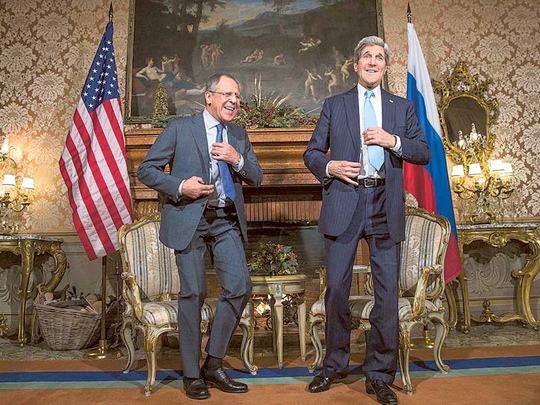
Rome: Israeli Prime Minister Benjamin Netanyahu on Monday angrily rejected a Palestinian bid to set a UN deadline for an end to Israel’s occupation amid a flurry of talks led by US top diplomat John Kerry.
“We will not accept attempts to dictate to us unilateral moves on a limited timetable,” the Israeli leader said before flying to Italy.
Amid a renewed drive to push the Israeli-Palestinian peace process to the top of the global agenda, Kerry and Netanyahu met in the US ambassador’s sumptuous residence in Rome.
The Americans are seeking to avert an end-of-year showdown at the United Nations Security Council, which could place them in a diplomatic quandary.
The Palestinians have said they will submit an Arab-backed draft text setting a two-year deadline for an end to the decades-long Israeli occupation of their lands to the UN as early as Wednesday.
Simultaneously France is leading European efforts to cobble together a more nuanced resolution which could prove more acceptable to the US administration.
The French text would also set a two-year timetable, but for concluding a peace treaty without mentioning the withdrawal of Israeli forces.
Paris is also hoping to seize more of the initiative by not leaving the negotiations solely in the hands of the US.
“The absence of a peace process is fuelling tensions on the ground, so it is imperative to make rapid progress on a UN resolution,” said French foreign ministry spokesman Romain Nadal.
“It is vital to relaunch the peace talks as soon as possible and on a credible basis to offer some kind of concrete political horizon to the parties,” he said.
US officials have said Kerry is aiming to learn more about the European initiative during his hastily-arranged pre-Christmas trip.
Traditionally the US has used its power of veto at the UN Security Council to shoot down what it sees as moves against its close regional ally, Israel.
But there is a growing impatience in Europe over the peace impasse amid fears the Middle East risks spiralling into even greater chaos.
Several European parliaments have called on their governments to move ahead with the recognition of a Palestinian state.
US officials told reporters accompanying Kerry that Washington has not yet decided whether to veto or back the French-led UN initiative.
The US administration opposes moves to bind negotiators’ hands through a UN resolution — particularly any attempt to set a deadline for the withdrawal of Israeli troops from the West Bank.
But a US veto risks running contrary to Washington’s avowed aim of a Palestinian state and would anger key Arab allies - many of whom are much-needed partners in the US-led coalition against Daesh militants.
And Netanyahu said that “in the reality in which Islamist terrorism is reaching out to all corners of the globe, we will rebuff any attempt that would put this terrorism inside our home.”
“We will stand firm in the face of any diktat,” the Israeli said ahead of Monday’s talks, which included a brief closed-doors meeting with Italian Prime Minister Matteo Renzi.
Kerry will later fly to Paris for a dinner meeting with his French, German and British counterparts and the new EU foreign policy chief Federica Mogherini.
He will then travel to London to meet with the chief Palestinian negotiator Saeb Erakat and the secretary general of the Arab League, Nabeel Al Arabi, on Tuesday.
French Foreign Minister Laurent Fabius is also to meet with Arabi on Tuesday.
Diplomatic sources say Paris is hoping to persuade the Palestinians to back their compromise resolution, rather than risk a US veto of the more muscular Arab version.
But the Palestinians appear divided, as frustration grows over the snail’s pace of diplomatic efforts.
Kerry met first in Rome on Sunday with Russian Foreign Minister Sergei Lavrov, who said the talks were “crucial” to stop the situation in the Middle East from deteriorating.
With snap Israeli elections looming in March, some Europeans have pointed to a narrow window of opportunity to push a UN resolution.












